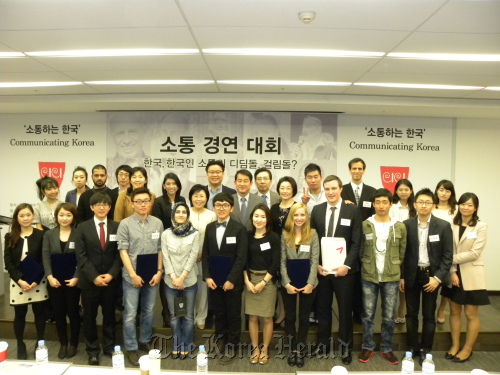French office worker wins the grand prize of 2012 CICI ‘Communicating Korea’ contest
A Russian-born woman who described her experience living with her Korean in-laws, a Frenchman who criticized Korea’s hierarchical work culture, and a Chinese student who commented on Korea’s dating culture were among the winners of a communication-themed speech contest Saturday.
Twenty finalists of the 2012 CICI “Communication Korea” speech contest shared their personal views on a diverse range of subjects regarding Korean culture and communication in Korean.
Among the 20 competing at the event held at the Samsung Electronics building in Seoul, nine were locals and 11 were foreign-born ― including international students and wives from overseas.
The competition was hosted by the Corea Image Communication Institute, a private non-profit research institute on Korea’s image and culture, with the aim of promoting better communication in contemporary Korea.
The participants were asked speak on one of the three given topics: SNS and its pros and cons; potential communication problems in Korea; and Korea’s cultural assets’ use as a means of communication with the global community.
The grand prize was given to Rengnez Aurelien, a 25-year-old Frenchman who works for a medical device company in Seoul. He and his Korean wife welcomed their first daughter two weeks ago. Aurelien gave a speech about Korea’s work culture, and how its strict hierarchical rules sometimes make it harder for people to freely communicate with their colleagues and superiors.
During the final group interview session along with seven other finalists, he answered “Shin Ramyeon,” when asked to creatively define the Korean term “jeong,” meaning emotional connection.
 |
Participants and judges of the 2012 CICI “Communicating Korea” contest pose for a photo after the award ceremony at the Samsung Electronics building in southern Seoul, Saturday. (CICI) |
“It’s like Shin Ramyeon,” he said in Korean. “It’s delicious and has that hearty flavor.”
After the award ceremony, Aurelien said he did not expect to win the grand prize at all, especially because he was competing against both Korean-fluent foreigners and locals. He was given a round-trip ticket to Europe and two million won in prize money.
“At first, I was like ‘how am I going to win?’ The Koreans have no problem in speaking because it is their mother tongue,” Aurelien told The Korea Herald.
“But I thought I’d do my best since I was given a chance. And what I like to do is to speak naturally from the heart. That’s what I tried to do.
“If possible, I’d like to actually give the prize tickets to my parents,” Aurelien continued. “So they can come here and meet my daughter.”
Meanwhile, Wang Chao, a university student from China, won the second-place prize for his speech on Korea’s dating culture. He kept the audience entertained throughout with his quirky sense of humor.
“A Chinese guy would applaud and compliment when his girlfriend tries a shirt on when they go out shopping together,” Wang said during his speech. “But Korean guys would very often say, ‘Just buy it, I’m hungry.’”
Wang received 2 million won in prize money. He also received a popularity award by receiving the highest number of votes from the audience members.
Local university student Lee Moo-yeon received the third prize for his speech on SNS and how it can improve people’s relationship with their families. He was given 1 million won in prize money.
Osipova Serafima, a Russian scholar who works at Korea Literature Translation Institute, won the “Culture Award,” a sidebar prize, for her personal account of communicating with her Korean husband and in-laws. Local university student Yoon Byeong-do received the same prize for his communication-themed speech, which touchingly described the true story of his grandfather.
Belarus-born student and wife of a Korean husband Aliona Yermakova, university student Kong Han-yi and Gyeonggi Province-based Japanese teacher Takako Yamagiwa also won sidebar prizes.
Meanwhile, Setare Noori, an exchange student from University of Tehran in Iran, captivated the audience with her passion for Korea and Korean culture. The Iranian student impressed the audience with her enthusiasm and her Korean language skills, especially after it was revealed that she had only been in Korea for seven weeks.
She has been studying the language on her own in Iran since watching the popular Korean drama show “Jewel in the Palace” when she was a teenager. Though she could not finish her speech in the given seven minutes, she was given a special prize after the competition.
Jasmine Lee, the Philippine-born naturalized Korean citizen and actress who was recently elected as a proportional representative of the Saenuri Party, served as one of the judges of the competition.
“I was very touched by the speeches,” Lee told The Korea Herald. “I think most of the conflicts we run into originate from communication problems. The speeches gave us a lot to think about. And it was great to see both Koreans and non-Koreans share their views about the shared theme of communication.”
Saturday’s event was sponsored by Samsung Electronics, the Korean Culture and Information Service and Asiana Airlines.
By Claire Lee (
dyc@heraldcorp.com)








![[Today’s K-pop] Blackpink’s Jennie, Lisa invited to Coachella as solo acts](http://res.heraldm.com/phpwas/restmb_idxmake.php?idx=644&simg=/content/image/2024/11/21/20241121050099_0.jpg)